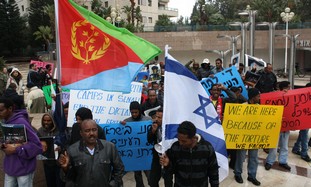Asylum seekers denied discounted bus pass due to ‘technicality’
An asylum seeker from Eritrea has been living and working legally in Israel – but is continuously denied a discounted electronic bus pass because she has no passport or formal identification card. The Transportation Ministry

An asylum seeker from Eritrea has been living and working legally in Israel – but is continuously denied a discounted electronic bus pass because she has no passport or formal identification card. The Transportation Ministry refuses to recognize her government-issued visa and claims this ‘technical difficulty’ is of limited urgency.
By Mara Getz Sheftel
Unfortunately exclusion, be it of women, Ethiopians, or African asylum-seekers, has become so pervasive in Israeli society that even government bodies dismiss it as a “technical difficulty.” This became apparent to me when I learned that asylum-seekers are denied access to Rav-Kav fare cards (electronic bus pass) and thus are denied access to discounted public transportation.
A few weeks ago I met with my friend Sarah (name has been changed to protect privacy) an asylum-seeker from Eritrea who has been living in Jerusalem legally for the past four years, with a conditional release visa from the Israeli government. Sarah told me about her new job and how happy she was to have a steady income working for a considerate boss. However, her next sentence began, “But I have a big problem…” As a single mother, suffering from a life-threatening illness and currently without a home, I thought that she was going to tell me how hard it is to care for her eight-month old alone, or how sick she has been feeling recently, or how desperately she needs to save money to afford her own place instead of sleeping on a different friend’s floor each night. But instead her sentence ended “…I cannot get a Rav Kav.”
Surprised by her “big problem” and certain I could help, I inquired about the details. Sarah explained to me that she had twice attempted to get a “personalized Rav Kav” at the Jerusalem Central Bus Station but was denied both times because she does not have a passport or an Israeli identity card to serve as identification. She explained that she needs a “personalized Rav Kav” as opposed to an “anonymous Rav Kav” because only with a personalized card can one purchase a free monthly pass or get any other discounted bus pass.
Certain that this must be an issue of a language barrier, Sarah happily agreed to try again, accompanied by a volunteer law student from Hebrew University. However, Sarah was once again denied a “personalized Rav Kav” based on insufficient identification. An asylum-seeker without a passport, Sarah’s visa, issued on behalf of the Israeli government, was not sufficient identification to obtain a bus pass.
Given Israel’s considerable role in drafting the 1951 Refugee Convention which defines the rights of asylum-seekers, a point of pride for a nation built upon absorbing refugees, denying asylum-seekers access to discounted bus fares on a technicality is truly an embarrassment. It should not be difficult for us to imagine the situation of passport-less, stateless asylum-seekers; examples in our own collective history range from the Exodus to Nazi Germany to Jews in Arab countries post-1948.
We are quick to remember the legacy of the Holocaust when it pertains to Jews, but our memory too often fails us when an opportunity arises to apply those lessons to non-Jews. My friend Sarah’s need for asylum is no less real than that of the countless generations of Jews forced to flee their homes and her basic right to live and work honorably are no less valid. These rights include equal access to affordable public transportation – something that poses no threat to the Israeli public.
In the past few weeks I have turned to various officials at the Ministry of Transportation and it became apparent that they are indeed aware that it is impossible to obtain a “personalized Rav Kav” throughout the country without a passport or national identification card, but that they see this as a “technical difficulty” of limited urgency. When Zionism’s founders envisioned a Jewish state like any other in the world, surely they did not imagine that we would get so muddled in building a technocracy, we would forget our compassion and our humanity. Meanwhile, as the decision makers create lists of priorities, my friend Sarah, baby resting on her narrow hip, trudges up and down the city’s hills, from Katamon to the Jerusalem city center, to Romema and back again, during this cold, rainy winter.
Mara Getz Sheftel is an educator for the Dorot Fellowship in Israel and has a MA in Public Policy from Hebrew University focused on migration and the welfare state. She has been working with the Asylum Seeking population in Jerusalem for the past 4 years. She lives in Jerusalem with her husband and daughter.
Source:972mag.com
